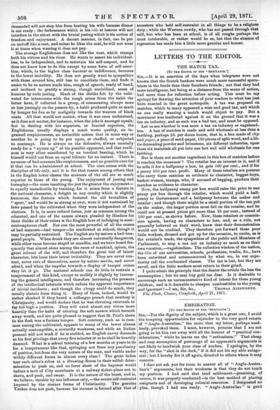LETTERS TO THE EDITOR.
THE MATCH TAX.
(TO THE EDITOR OF THE "SPECTATOR.")
SIR, —It is an assertion of the days when telegrams were not known that the Scotch bankers were much more successful specu- lators in the funds than their Southern friends ; not that they had more intelligence, but being at a distance from the scene of action, had more time for reflection before acting. This must be my apology for drawing the attention of your readers to what has just been enacted in the great metropolis. A tax was proposed on matches, which to many appeared a wise and good tax, and which no one really wanting a match would object to pay. But a movement was instituted against it on the ground that it was a tax on industry, and as such was a bad tax, and must be opposed.
Let us see whether it was more a tax on industry or vagabond- ism. A box of matches is made and sold wholesale at less than a farthing, perhaps 2d. per dozen boxes, that is, a box made of chip and paper, a piece of sand-paper, 100 pieces of split wood, and a lit- tle detonating powder and brimstone, six different industries, upon these six materials all put into one box and sold wholesale for one farthing.
But is there not another ingredient in this box of matches before it reaches the consumer ? The retailer has an interest in it, and if he sells it for a halfpenny a box, he gets 100 per cent., and if for a penny 300 per cent. profit. Many of these retailers are persons who carry these matches as evidence to character, beggar-boys, basket-women, tramps, who, if accused of begging, produce their matches as evidence to character.
Now, the halfpenny stamp per box would raise the price to one penny per box through the retailer, which would yield a half- penny to Government and a halfpenny between the maker and retailer ; and though there might be a small portion of the tax put on the maker, the larger portion must fall on the retailer, and he could not at present prices get more than 25 per cent., instead of 100 per cent., as shown before. Now, these retailers or commis- sion agents, having no characters to lose, and, as a rule, not generally believed on their word, knew that their demonstration would not be credited. They therefore put forward these poor little workers, dressed and got up for the occasion, to excite, as is the retailer's trade, the sympathies of the public and Members of Parliament, to stop a tax not on industry so much as on their own vocation,—vagabondistn. The collective wisdom of the nation, the elite of our universities, schools, professions, trades, &c., have been outwitted and outmanceuvred by what we, in our supe- riority call the uneducated classes. The tax is lost, but they are saved, and the little workers must return to their grind.
I quite admit the principle that the dearer the article the less the consumption ; but we may buy gold too dear. Is it desirable to encourage such an unremunerative kind of labour for these young children, and is it desirable to cheapen combustibles to the young


































 Previous page
Previous page